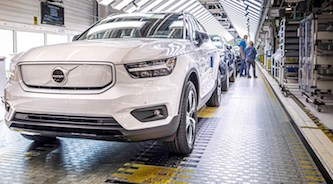Volvo Cars announced it plans to become a fully electric car company by 2030 — and will phase out any car in its global portfolio with an internal combustion engine, including hybrids.
The firm joins a growing number of carmakers planning to phase out fossil-fuel engines by the end of this decade.
Last month, Ford Motor Co said its cars in Europe will be fully electric by 2030, while Tata Motors unit Jaguar Land Rover said its Jaguar brand will be entirely electric by 2025 and it will launch electric models of its entire portfolio by 2030.
Bentley, owned by Germany’s Volkswagen, said last November its models will be all electric by 2030.
Volvo Car said: “The company’s transition towards becoming a fully electric car maker is part of its ambitious climate plan, which seeks to consistently reduce the life cycle carbon footprint per car through concrete action.
“Its decision also builds on the expectation that legislation as well as a rapid expansion of accessible high quality charging infrastructure will accelerate consumer acceptance of fully electric cars.
“Volvo Cars’ move towards full electrification comes together with an increased focus on online sales and a more complete, attractive and transparent consumer offer under the name Care by Volvo.
“All fully electric models will be available online only …
“The 2030 ambition represents an acceleration of Volvo Cars’ electrification strategy, driven by strong demand for its electrified cars in recent years and a firm conviction that the market for combustion engine cars is a shrinking one.”
Volvo Cars has about 40,000 employees and has been owned by China’s Zhejiang Geely Holding since 2010.
The company’s head office, product development, marketing and administration functions are mainly located in Gothenburg, Sweden.
Volvo Cars’ head office for APAC is located in Shanghai.
The company’s main car production plants are located at Gothenburg in Sweden, Ghent in Belgium, South Carolina in the US, and Chengdu and Daqing in China, while engines are manufactured in Skövde, Sweden, and Zhangjiakou, China, and body components in Olofström, Sweden.
Volvo Cars CEO Håkan Samuelsson said: “To remain successful, we need profitable growth.
“So instead of investing in a shrinking business, we choose to invest in the future – electric and online.
“We are fully focused on becoming a leader in the fast-growing premium electric segment.”
Volvo Cars launched its first fully electric car, the XC40 Recharge, in markets around the globe last year, and unveiled its second fully electric car, a new model in the 40 Series, this week.
The company said it will roll out several additional electric models in the years to come.
It aims for 50% of its global sales to consist of fully electric cars by 2025, with the rest hybrids.
By 2030, it said every car it sells should be fully electric.
“There is no long-term future for cars with an internal combustion engine,” said Henrik Green, chief technology officer.
“We are firmly committed to becoming an electric-only car maker and the transition should happen by 2030.
“It will allow us to meet the expectations of our customers and be a part of the solution when it comes to fighting climate change.”
